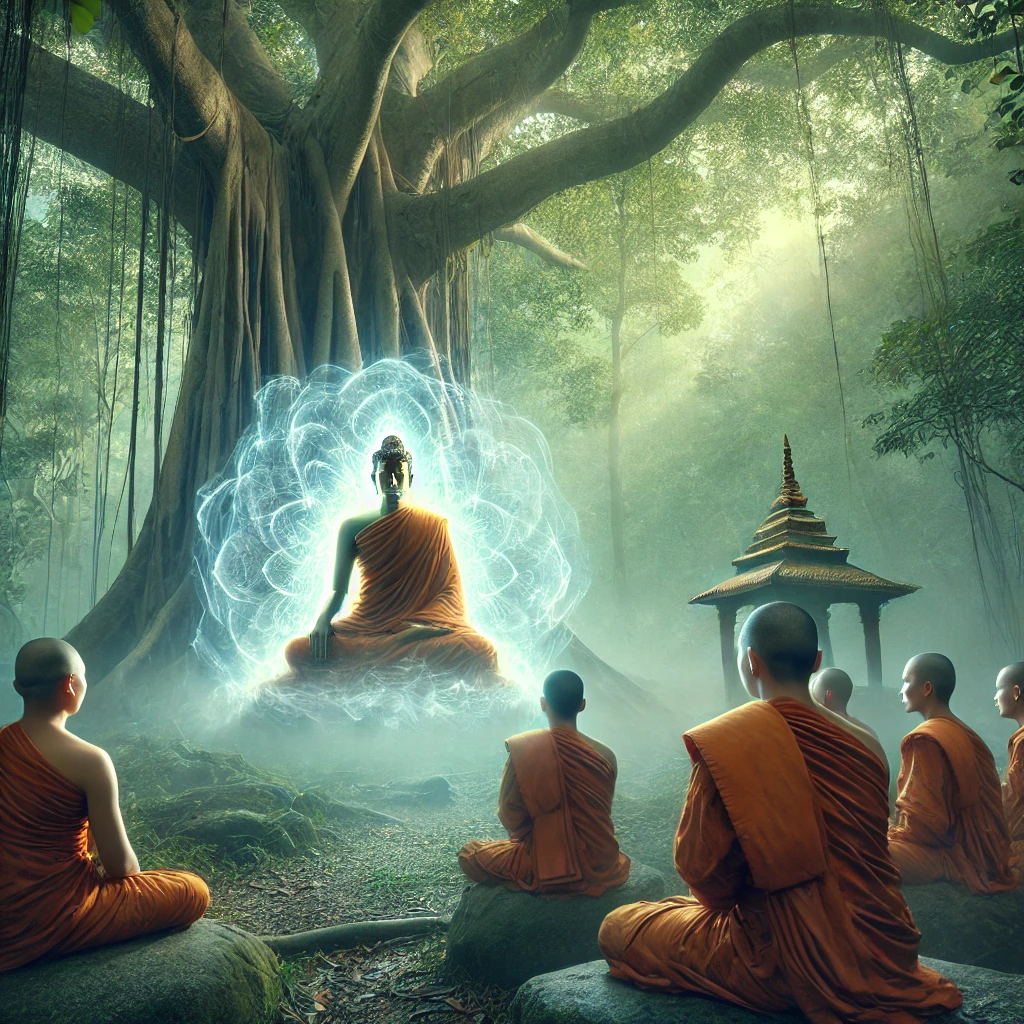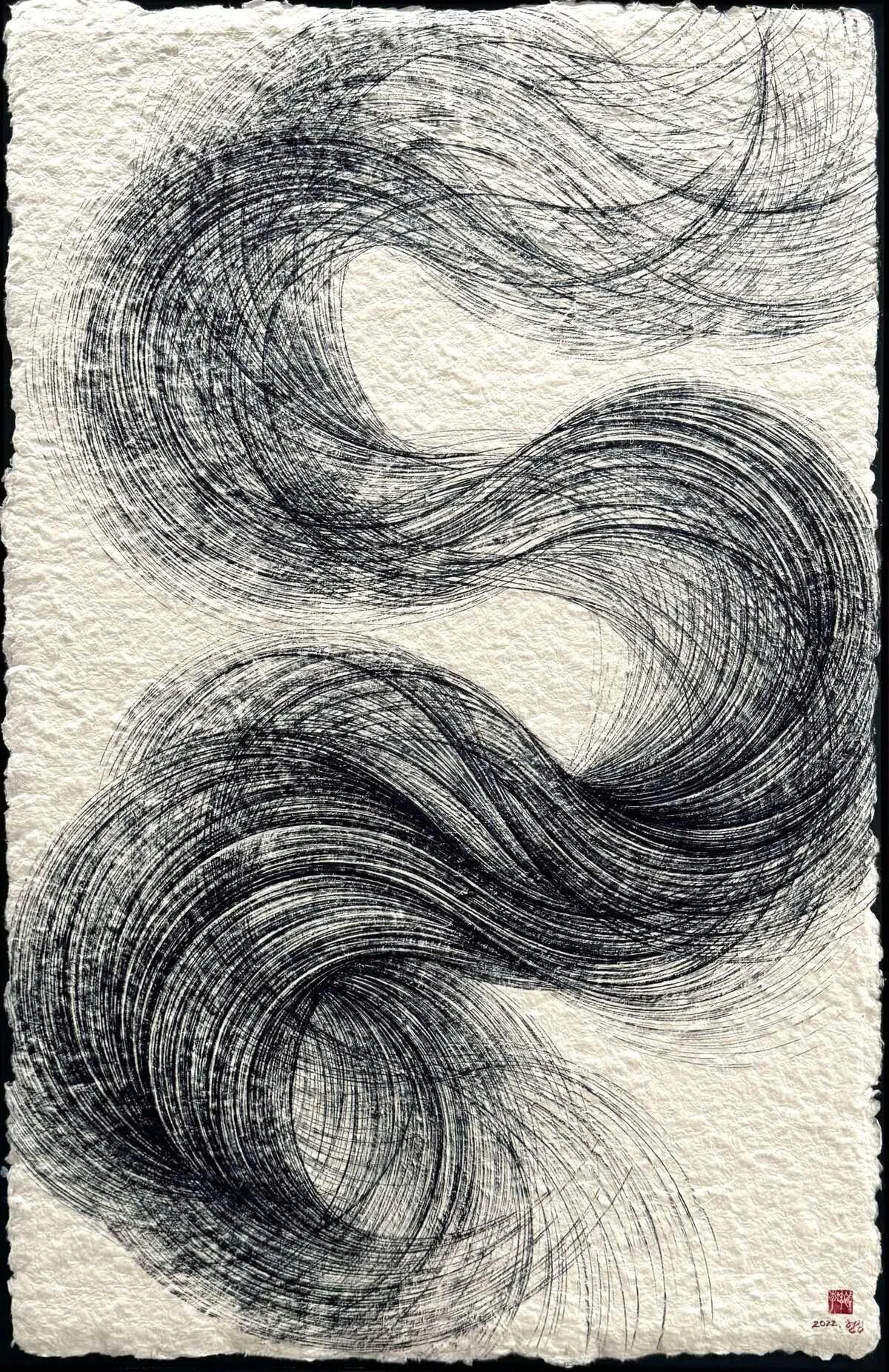Early Buddhism - Words of the Buddha
A community dedicated to supporting awakening to the truth of enlightenment (Nibbāna) through inquiring into the teachings of the Buddha (Dhamma).
One awakens to the truth of enlightenment (aka stream entry) by:
- Actively learning and reflecting,
- Independently verifying (without believing) to observe the truth
- Putting to practise after seeing benefits to the condition of mind.
Enlightenment is the elimination of greed, anger and delusion, dissolution of the ego and realisation of non-self.
An enlightened being would experience unconditional joy, contentment, freedom from beliefs, a high degree of concentration, and blossoming personal/professional relationships.
In this verse, the Buddha advises Tissa Metteyya on the dangers of engaging in sexual activity and the benefits of solitary conduct.
Thus the Venerable Tissa Metteyya said: "For one engaged in sexual activity, speak of the obstacles, dear sir; Having heard your teaching, we shall practice in solitude."
The Blessed One addressed Metteyya: "One engaged in sexual pursuits, tends to forget or disregard the teachings; And practices the wrong path, this is considered ignoble in him.
Whoever, once solitary in conduct, now engages in sexual activity; He resembles a broken vehicle, and is deemed lowly by ordinary people.
His fame and renown, which were once prominent, now decline or completely fade; Seeing this as well, you should practice to abandon sexual activity.
Enclosed by intentions, he broods like a miser; Upon hearing the criticism of others, such a one becomes disturbed.
Provoked by others' reproach, he responds with harsh words; Indeed, he comes into a great conflict, by engaging in wrong speech.
Regarded as wise, and dedicated to solitary conduct; But then engaging in sexual activity, he will become weary as if enfeebled.
Understanding this danger, the sage, reflecting on both past and future; should firmly establish solitary conduct, and refrain from engaging in sexual activity.
One should train only in seclusion, this is the supreme path for the noble ones; One who would not consider oneself 'best' because of this, he is indeed near to Nibbāna.
As the sage dwells, empty of desires, unconcerned with sensual pleasures; Having crossed the flood, they're envied, by those bound to sensual pleasures.
Picture: Among the Fallen Leaves by David Grossmann (2014)
Related Teachings:
Skillfully grasping the Dhamma: The Simile of Water Snake (from MN 22) - In this teaching, the Buddha shares on learning the Dhamma by investigating its meaning with close examination, through the simile of skillfully holding a water snake.
Allure and Drawbacks of Desiring Pleasure (Snp 4.1) - This verse succinctly captures the allure and the drawbacks of engaging in sense-desires.
Intoxicated with Vanity of Youth, Health and Life (AN 3.31) - In this teaching, the Buddha recounts his delicate bringing up, and warns on the three intoxications: of youth, health, and life.

2.3
"Bhikkhus, there are these two things that cause regret (torment, cause remorse). What are the two? Here, bhikkhus, a certain person has engaged in bodily misconduct but has not engaged in good bodily conduct; has engaged in verbal misconduct but has not engaged in good verbal conduct; has engaged in mental misconduct but has not engaged in good mental conduct. He regrets, 'I have engaged in bodily misconduct'; he regrets, 'I have not engaged in good bodily conduct'; he regrets, 'I have engaged in verbal misconduct'; he regrets, 'I have not engaged in good verbal conduct'; he regrets, 'I have engaged in mental misconduct'; he regrets, 'I have not engaged in good mental conduct.' These, indeed, bhikkhus, are the two things that cause regret."
2.4
"Bhikkhus, there are these two things that do not cause regret. What are the two? Here, bhikkhus, a certain person has engaged in good bodily conduct but has not engaged in bodily misconduct; has engaged in good verbal conduct but has not engaged in verbal misconduct; has engaged in good mental conduct but has not engaged in mental misconduct. He does not regret, 'I have engaged in good bodily conduct'; he does not regret, 'I have not engaged in bodily misconduct'; he does not regret, 'I have engaged in good verbal conduct'; he does not regret, 'I have not engaged in verbal misconduct'; he does not regret, 'I have engaged in good mental conduct'; he does not regret, 'I have not engaged in mental misconduct.' These, indeed, bhikkhus, are the two things that do not cause regret."
Related Teachings:
Fear arises from harm (Snp 4.15) - The Buddha shares in poignant terms his observations on the agitation all beings experience which led to his urgency to awaken. He then shares on the path to awakening and describes the dwelling of an awakened being.
Six Directions: A teaching on purifying ethical conduct (DN 31) - The Buddha encounters a young man who honors his dead parents by performing rituals. The Buddha recasts the meaningless rites in terms of virtuous conduct. This is one of the most detailed discourses on ethics for lay people.
The path naturally flows for an ethical person (AN 11.2) - A virtuous person need not make a wish; it is natural for the path to flow on.
Way of Practice for cultivating Right Action (From MN 61) - The Buddha teaches Rāhula on how one cultivates the wisdom of non-harm by reflecting on one's bodily, verbal and mental actions prior to the action, while doing the action and after having done the action.
Doer of good deeds rejoices here and after death (DhP 15, 16)

Not the faults of others,
nor what others have or have not done;
One should observe one's own actions,
deeds, both done and not done.
-- DhammaPada Verse 50
Related Teachings:
On Wise Attention | A Trainee - First (ITI 16) - Wise attention or proper and careful attention is a quality of the mind that comes to growth and maturity as one continues learning, reflecting and applying the teachings in practice. It is one of the four factors that leads one to awakening to the truth of enlightenment, to stream-entry.
Causes for the arising and expansion of the five hindrances (AN 1.11 - 20) - The Buddha explains what causes the hindrances to arise and how to abandon them.
Navigating through 30 mental qualities that lead to enlightenment, to the arising of the Buddha (AN 10.76) - The Buddha lays down 30 different mental qualities in ten sets of threes that lead all the way to enlightenment. He explains them both backwards and forwards. One can use this teaching to draw out a skill map of which qualities they've cultivated and which ones are next to cultivate.

Ānanda explains to the brahmin Uṇṇābha how desire is abandoned by developing the four bases of psychic ability.
"Thus have I heard - At one time, the Venerable Ānanda was staying at Ghositā's park in Kosambi. Then the brahmin Uṇṇābha approached the Venerable Ānanda. Having approached, he exchanged greetings with the Venerable Ānanda. After exchanging friendly and courteous greetings, he sat down to one side. Seated to one side, the brahmin Uṇṇābha said to the Venerable Ānanda: "Master Ānanda, for what purpose is the spiritual life lived under the ascetic Gotama?"
"Brahmin, it is for the purpose of abandoning desire that the spiritual life is lived under the Blessed One."
"But, Master Ānanda, is there a path, is there a way to abandon this desire?"
"Yes, brahmin, there is a path, there is a way to abandon this desire."
"What, then, is the path, what is the way to abandon this desire?"
"Here, brahmin, a bhikkhu: 1) develops the basis of psychic ability that is endowed with collectedness arising from desire (an aspiration, a goal, an interest, an objective, i.e. a wholesome desire) and accompanied by intentional effort; 2) develops the basis of psychic ability that is endowed with collectedness arising from energy (persistence) and accompanied by intentional effort; 3) develops the basis of psychic ability that is endowed with collectedness arising from [purification of] mind and accompanied by intentional effort; and 4) develops the basis of psychic ability that is endowed with collectedness arising from investigation (consideration, reflection, and examination) and accompanied by intentional effort. This, brahmin, is the path, this is the way to abandon this desire."
"In that case, Master Ānanda, it would be impossible to abandon desire by means of desire itself."
"Then, brahmin, I will ask you a question. Answer as you see fit. What do you think, brahmin: Did you earlier have the desire, 'I will go to the park,' and now that you have come to the park, has that desire you had before to come to the park been abandoned?"
"Yes, sir."
"Did you earlier arouse energy, thinking, 'I will go to the park,' and now that you have come to the park, has that energy you had before to come to the park been abandoned?"
"Yes, sir."
"Did you earlier resolve in your mind, 'I will go to the park,' and now that you have come to the park, has that resolution in the mind you had before to come to the park been abandoned?"
"Yes, Master Ānanda."
"Did you earlier make an investigation, 'Shall I go to the park?' and now that you have come to the park, has that investigation you had before to come to the park been abandoned?"
"Yes, sir."
"In the same way, brahmin, when a bhikkhu is an Arahant, one whose taints have been exhausted, who has lived the spiritual life, done what had to be done, laid down the burden, attained his own goal, utterly exhausted the fetters of existence, and is completely liberated through final knowledge, the desire that he had before for the attainment of arahantship is abandoned once arahantship is attained. The energy that he had aroused before for the attainment of arahantship is abandoned once arahantship is attained. The resolution in the mind that he had before for the attainment of arahantship is abandoned once arahantship is attained. The investigation that he had made before for the attainment of arahantship is abandoned once arahantship is attained. What do you think, brahmin, such being the case, does the [path] have an end or is it endless?"
"Indeed, Master Ānanda, in such a case, the [path] has an end, it is not endless. Excellent, Master Ānanda, excellent. It is as if one were to set upright what had been overturned, to reveal what was hidden, to show the way to one who was lost, or to hold a lamp in the dark so that those with eyes could see forms. So, too, Master Ānanda has, in many ways, made the Dhamma clear. I go to Master Gotama for refuge, and to the Dhamma and to the Bhikkhu Saṅgha. Let Master Ānanda remember me as a lay follower who has gone to him for refuge from this day onward, for life."
The path to enlightenment can only be undertaken with an aspiration (a goal, an objective, an interest, i.e. a wholesome desire). As the teaching on the detailed analysis on the four bases of psychic abilities shares, this should be present in balance - not too low that it causes one to be inwardly inhibited, i.e. overcome by lethargy, dullness and drowsiness and not too intense that it leads to restlessness, and neither in a way that it leads to attention becoming outwardly scattered (i.e. sensual desires / craving / wanting and yearning for material objects and experiences).
Similarly, while keeping in mind the qualities of fewness of desires and contentment, one can have some other aspiration - whether worldly or spiritual in nature, as they pursue the path to enlightenment.
Related Teachings:
The defining characteristic of living beings (SN 23.2) - Rādha asks the Buddha about a the term "being", and the Buddha explains in terms of craving for the five aggregates. He compares such craving to a child playing with sandcastles.
Why does the Buddha teach the removal of desire and lust (SN 22.2) - When a number of bhikkhus are heading for lands west, the Buddha advises them to speak with Sāriputta before they go. Sāriputta reminds them that in foreign lands they will be scrutinized for their understanding, so they need to be able to answer questions on the teaching. He goes on to explain that the Dhamma is for the removal of desire for the five aggregates.
Forest Retreat | Suitable place to live (MN 17) - The Buddha teaches the bhikkhus how to reflect on a dependence that one is taking using the example of a suitable place to live: a forest retreat, a village, a market town, a city, a country. He concludes with an example of depending on a certain person similarly.

1.56
"Bhikkhus, whatever qualities are unwholesome, associated with unwholesomeness, and aligned with the unwholesome, all of them are preceded by the mind. The mind arises first for those qualities, and then unwholesome qualities follow."
1.57
"Bhikkhus, whatever qualities are wholesome, associated with wholesomeness, and aligned with the wholesome, all of them are preceded by the mind. The mind arises first for those qualities, and then wholesome qualities follow."
Observing for the presence and absence of the wholesome and unwholesome mental qualities is then a great way to observe for the trajectory of the mind itself.
Being able to correctly observe for the qualities provides for an opportunity to apply the right teachings. This is where a teacher, or having friends who are practitioners can help.
The gradual training guidelines when practiced in form the support that allows for correct observation to take place by oneself.
Related Teachings:
Steadying the mind against the poisons of greed, hate and delusion (AN 4.117) - The Buddha's teachings when practiced become a support for the mind, allowing it to remain steady in situations that once used to shake it up.
A teaching on four fundamental questions | Ummaggasutta (AN 4.186) - The first question relates to this teaching.
An ordinary person might become free of attachment to body, but not mind (SN 12.61) - The Buddha is sharing here that it's difficult for an ordinary person to not to be attached to the mind, even if they're able to see the body (form) as not-self due to its aging and impermanent nature. This underlying tendency to have affinity, attachment, relishing in the mind is one that has lead to the continuing of the transmigration.

This teaching is from the section The Planes of Realization of "In the Buddha's Words" by Bhikkhu Bodhi.
The Buddha explains that even a Wheel-Turning Monarch, if not endowed with four qualities, is not freed from hell, the animal realm, the ghost realm, and the lower realms. On the other hand, a noble disciple, endowed with four qualities, is freed from these states.
At Sāvatthi.
There, the Blessed One addressed the bhikkhus, "Bhikkhus."
"Venerable sir," those bhikkhus replied to the Blessed One. The Blessed One said this:
"Bhikkhus, even if a Wheel-Turning Monarch, having ruled the four continents, after the break-up of the body, upon death, is reborn in a good destination, in the heavenly world, in companionship with the deities of the Thirty-three, where he enjoys himself in the Nandana Grove surrounded by a group of celestial nymphs, delighting in the five kinds of heavenly sensual pleasures, yet, if he is not endowed with four qualities, he is still not freed from hell, not freed from the animal realm, not freed from the ghost realm, and not freed from the states of misery, bad destinations, and the lower realms.
On the other hand, bhikkhus, even if a disciple of the noble ones lives off alms food, wears ragged robes, and is endowed with four qualities, he is freed from hell, freed from the animal realm, freed from the domain of ghosts, and freed from the states of misery, bad destinations, and the lower realms.
What four? Here, bhikkhus, a disciple of the noble ones is endowed with experiential confidence in the Buddha: 'Indeed, the Blessed One is the Worthy One, perfectly enlightened, accomplished in wisdom and conduct, well-gone, knower of the world, unsurpassed leader of persons to be trained, teacher of gods and humans, enlightened, blessed.'
He is endowed with experiential confidence in the teachings of the Buddha: 'Indeed, the Dhamma is well proclaimed by the Blessed One, directly visible, immediate, inviting verification, leading onward, to be personally experienced by the wise.'
He is endowed with experiential confidence in the Sangha: 'Indeed, the Sangha of the Blessed One's disciples is practicing the good way, practicing the upright way, practicing the knowledgeable way, practicing the proper way; these are the four pairs of persons, the eight types of individuals - this Sangha of the Blessed One's disciples is worthy of gifts, worthy of hospitality, worthy of offerings, worthy of reverential salutation, the unsurpassed field of merit for the world.'
He is endowed with beloved noble virtues, unbroken, unblemished, unspotted, untarnished, leading to collectedness (concentration [samādhi]).
Thus, he is endowed with these four qualities.
Bhikkhus, the acquisition of the four continents cannot equal even a sixteenth part of the acquisition of these four qualities.
This is a teaching that one can verify after a period of time as one is practicing per the Gradual Training Guidelines (MN 107) by reflecting on the discontentment that has been eliminated from the mind. For one that attains stream-entry, the discontentment that has been eliminated is a very significant amount, and such an individual slants, slopes and inclines towards Nibbāna.
What the Buddha is sharing relating to the aspect of rebirth, however, is something one can verify if one intends to once their practice is further along. If one has no experience wrt rebirth, accepting it as being provisionally true can be beneficial, or one can choose to not form any view on it. In this way, if such an experience arises at some point in one's practice, one can maintain steadiness of the mind.
Related Teachings:
What is the stream and who is a stream-enterer (SN 55.5) - A dialogue between the Buddha and Sāriputta on the four factors for stream-entry: 1.) association with good people, 2.) hearing the true teaching, 3.) wise attention, and 4.) practice in accordance with the teaching. Sāriputta also defines the "stream" and the "stream-enterer" and the Buddha approves of his answer.
A small amount of dust on the tip of a fingernail (SN 13.1) - For someone who has seen the truth of awakening, the suffering eliminated is like the great earth; what remains is like the dust on the tip of a fingernail.
Entering the Fixed Course of Rightness (SN 25.1) - An individual who either has faith and/or conviction in the Buddha's teachings or has cultivated a partial degree of wisdom through independent verification, will not die without having realized the fruit of stream-entry.

"These are my children, this is my wealth," with such thoughts the immature person is afflicted; One's self is not even one's own, how then, can there be sons? How then, can there be wealth?
-- DhammaPada Verse 62
Picture: Looking for the self and not finding it https://twitter.com/this_is_silvia/status/1766133309497659828 ↗️
Related Teachings:
Not viewing in the extremes of existence and non-existence (SN 12.15) - A perspective of seeing the world through the lens of existence may make one fear the natural cycle of aging, sickness, and death, or to come to terms with this natural truth when seen in the suffering of other beings. The other extreme may lead to challenges with harmoniously existing with all beings.
Teachings on aging and death (from SN) - The Buddha is sharing to drop the world's bait as life is very short, and guides to do good deeds that brings one to joy.
A handful of leaves 🍃 - Essential Teachings of the Buddha to Understanding The Four Noble Truths - A collection of teachings on understanding the four noble truths through the words of the Buddha.

The Buddha teaches the bhikkhus how to reflect on a dependence that one is taking using the example of a suitable place to live: a forest retreat, a village, a market town, a city, a country. He concludes with an example of depending on a certain person similarly.
Thus have I heard — At one time, the Blessed One was dwelling at Sāvatthi in Jeta's Grove, in Anāthapiṇḍika's park. There the Blessed One addressed the bhikkhus, saying: "Bhikkhus."
"Venerable sir," those bhikkhus replied to the Blessed One. The Blessed One said this:
"Bhikkhus, I will teach you a discourse on forest retreats. Listen to it and pay close attention, I will speak."
"Yes, venerable sir," those bhikkhus replied to the Blessed One. The Blessed One said this:
Dependence on a Forest Retreat
"Bhikkhus, here a bhikkhu dwells in dependence on a forest retreat. However, while dwelling there, his unestablished mindfulness does not become established, his distracted mind does not become collected, the taints that are not exhausted do not come to exhaustion, and he does not attain the unattained supreme security from bondage. Additionally, the requisites of life that should be obtained by one gone forth — robes, alms-food, resting place, and medicinal requisites, are hard to come by. On account of that, bhikkhus, that bhikkhu should reflect thus: 'I am dwelling in dependence on this forest retreat, but my unestablished mindfulness does not become established, my distracted mind does not become collected, the taints that are not exhausted do not come to exhaustion, and I do not attain the unattained supreme security from bondage. Additionally, the requisites of life that should be obtained by one gone forth — robes, alms-food, resting place, and medicinal requisites, are hard to come by.' Having reflected thus, that bhikkhu should depart from that forest retreat that very night or that very day; he should not remain there.
Bhikkhus, here a bhikkhu dwells in dependence on a forest retreat. However, while dwelling there, his unestablished mindfulness does not become established, his distracted mind does not become collected, the taints that are not exhausted do not come to exhaustion, and he does not attain the unattained supreme security from bondage. Yet, the requisites of life that should be obtained by one gone forth — robes, alms-food, resting place, and medicinal requisites, are easily obtained. On account of that, bhikkhus, that bhikkhu should reflect thus: 'I am dwelling in dependence on this forest retreat. However, my unestablished mindfulness does not become established, my distracted mind does not become collected, the taints that are not exhausted do not come to exhaustion, and I do not attain the unattained supreme security from bondage. Yet, the requisites of life that should be obtained by one gone forth — robes, alms-food, resting place, and medicinal requisites, are easily obtained. However, it was not for the sake of robes that I went forth from the household life into homelessness, nor for the sake of alms-food, nor for the sake of a resting place, nor for the sake of medicinal requisites for the sick. Moreover, while I dwell in dependence on this forest retreat, my unestablished mindfulness does not become established, my distracted mind does not become collected, the taints that are not exhausted do not come to exhaustion, and I do not attain the unattained supreme security from bondage.' Having reflected thus, that bhikkhu should with a sense of urgency, depart from that forest retreat, and should not remain there."
"Bhikkhus, here a bhikkhu dwells in dependence on a forest retreat. However, while dwelling there, his unestablished mindfulness becomes established, his distracted mind becomes collected, the taints that are not exhausted come to exhaustion, and he attains the unattained supreme security from bondage. Yet, the requisites of life that should be obtained by one gone forth—robes, alms-food, resting place, and medicinal requisites, are obtained with difficulty. On account of that, bhikkhus, that bhikkhu should reflect thus: 'I am dwelling in dependence on this forest retreat. However, my unestablished mindfulness becomes established, my distracted mind becomes collected, the taints that are not exhausted come to exhaustion, and I attain the unattained supreme security from bondage. Yet, the requisites of life that should be obtained by one gone forth — robes, alms-food, resting place, and medicinal requisites, are obtained with difficulty. However, it was not for the sake of robes that I went forth from the household life into homelessness, nor for the sake of alms-food, nor for the sake of a resting place, nor for the sake of medicinal requisites for the sick. Moreover, while I dwell in dependence on this forest retreat, my unestablished mindfulness becomes established, my distracted mind becomes collected, the taints that are not exhausted come to exhaustion, and I attain the unattained supreme security from bondage.' Having reflected thus, that bhikkhu should remain in that forest retreat with a sense of urgency, and should not depart.
Bhikkhus, here a bhikkhu dwells in dependence on a forest retreat. However, while dwelling there, his unestablished mindfulness becomes established, his distracted mind becomes collected, the taints that are not exhausted come to exhaustion, and he attains the unattained supreme security from bondage. Additionally, the requisites of life that should be obtained by one gone forth — robes, alms-food, resting place, and medicinal requisites, are easily obtained. On account of that, bhikkhus, that bhikkhu should reflect thus: 'I am dwelling in dependence on this forest retreat. However, my unestablished mindfulness becomes established, my distracted mind becomes collected, the taints that are not exhausted come to exhaustion, and I attain the unattained supreme security from bondage. Additionally, the requisites of life that should be obtained by one gone forth — robes, alms-food, resting place, and medicinal requisites, are easily obtained.' Therefore, bhikkhus, that bhikkhu should remain in that forest retreat for as long as he lives, and should not depart.
Dependence on a Village
... similar ...
Dependence on a Market Town
... similar ...
Dependence on a City
... similar ...
Dependence on a Country
... similar ...
Dependence on a Certain Person
Bhikkhus, here a bhikkhu dwells in dependence on a person. However, while dwelling there, his unestablished mindfulness does not become established, his distracted mind does not become collected, the taints that are not exhausted do not come to exhaustion, and he does not attain the unattained supreme security from bondage. Additionally, the requisites of life that should be obtained by one gone forth — robes, alms-food, resting place, and medicinal requisites, are obtained with difficulty. On account of that, bhikkhus, that bhikkhu should reflect thus: 'I am dwelling in dependence on this person, but my unestablished mindfulness does not become established, my distracted mind does not become collected, the taints that are not exhausted do not come to exhaustion, and I do not attain the unattained supreme security from bondage. Additionally, the requisites of life that should be obtained by one gone forth — robes, alms-food, resting place, and medicinal requisites, are obtained with difficulty.' Therefore, bhikkhus, that bhikkhu should depart from that person without asking for permission that very night or that very day, and should not follow them.
Bhikkhus, here a bhikkhu dwells in dependence on a person. However, while dwelling there, his unestablished mindfulness does not become established, his distracted mind does not become collected, the taints that are not exhausted do not come to exhaustion, and he does not attain the unattained supreme security from bondage. Additionally, the requisites of life that should be obtained by one gone forth — robes, alms-food, resting place, and medicinal requisites, are easily obtained. On account of that, bhikkhus, that bhikkhu should reflect thus: 'I am dwelling in dependence on this person. However, my unestablished mindfulness does not become established, my distracted mind does not become collected, the taints that are not exhausted do not come to exhaustion, and I do not attain the unattained supreme security from bondage. Additionally, the requisites of life that should be obtained by one gone forth — robes, alms-food, resting place, and medicinal requisites, are easily obtained. However, it was not for the sake of robes that I went forth from the household life into homelessness, nor for the sake of alms-food, nor for the sake of a resting place, nor for the sake of medicinal requisites for the sick. Moreover, while I dwell in dependence on this person, my unestablished mindfulness does not become established, my distracted mind does not become collected, the taints that are not exhausted do not come to exhaustion, and I do not attain the unattained supreme security from bondage.' Having reflected thus, that bhikkhu should, with a sense of urgency, depart from that person, and should not follow them.
Bhikkhus, here a bhikkhu dwells in dependence on a person. However, while dwelling there, his unestablished mindfulness becomes established, his distracted mind becomes collected, the taints that are not exhausted come to exhaustion, and he attains the unattained supreme security from bondage. Additionally, the requisites of life that should be obtained by one gone forth — robes, alms-food, resting place, and medicinal requisites, are obtained with difficulty. On account of that, bhikkhus, that bhikkhu should reflect thus: 'I am dwelling in dependence on this person. However, my unestablished mindfulness becomes established, my distracted mind becomes collected, the taints that are not exhausted come to exhaustion, and I attain the unattained supreme security from bondage. Additionally, the requisites of life that should be obtained by one gone forth — robes, alms-food, resting place, and medicinal requisites, are obtained with difficulty. However, it was not for the sake of robes that I went forth from the household life into homelessness, nor for the sake of alms-food, nor for the sake of a resting place, nor for the sake of medicinal requisites for the sick. Moreover, while I dwell in dependence on this person, my unestablished mindfulness becomes established, my distracted mind becomes collected, the taints that are not exhausted come to exhaustion, and I attain the unattained supreme security from bondage.' Having reflected thus, that bhikkhu should remain with that person, and should not depart.
Bhikkhus, here a bhikkhu dwells in dependence on a person. However, while dwelling there, his unestablished mindfulness becomes established, his distracted mind becomes collected, the taints that are not exhausted come to exhaustion, and he attains the unattained supreme security from bondage. Additionally, the requisites of life that should be obtained by one gone forth — robes, alms-food, resting place, and medicinal requisites, are easily obtained. On account of that, bhikkhus, that bhikkhu should reflect thus: 'I am dwelling in dependence on this person. However, my unestablished mindfulness becomes established, my distracted mind becomes collected, the taints that are not exhausted come to exhaustion, and I attain the unattained supreme security from bondage. Additionally, the requisites of life that should be obtained by one gone forth — robes, alms-food, resting place, and medicinal requisites, are easily obtained.' Therefore, bhikkhus, that bhikkhu should follow that person for as long as he lives, and should not depart, even if urged to leave.
The Blessed One said this. Those bhikkhus were satisfied and rejoiced in the Blessed One's words.
The ultimate goal of one's life practice is to come to self-reliance, to make oneself one's refuge.
The Buddha's guidance here is about the way of practice towards this goal and it can be applied holistically to any other dependence one is taking: a friendship, a teacher, a relationship, a job, a career, a habit, a practice - by reflecting often on whether such a dependence produces improved mindfulness, improved collectedness and seeing whether the taints that are not yet exhausted come to exhaustion.
Related Teachings
Way of Practice for cultivating Right Action (From MN 61) - The Buddha teaches Rāhula on how one cultivates the wisdom of non-harm by reflecting on one's bodily, verbal and mental actions prior to the action, while doing the action and after having done the action.
Investigate the Teacher Himself (MN 47) ↗️ - In this teaching, the Buddha shows his commitment to radical accountability and integrity. He does not merely pay lip service to the notion of open inquiry, but lays out a detailed and exacting procedure by which his students should test him. By extension, this approach may be applied to any spiritual teacher.
Be an island unto yourself, with no other refuge (SN 47.13) - On the passing away of Sāriputta, the Buddha advises Ānanda to be an island unto himself, with no other refuge, with the Dhamma as his island, with the Dhamma as his refuge, not dependent on another as a refuge.

Thus it was said by the Blessed One, said by the Arahant, as I have heard:
"Bhikkhus, I do not see any other single barrier by which beings, enveloped by it, run through and undergo repeated existence for a long time, like this barrier of ignorance. Indeed, bhikkhus, it is because beings are enveloped by the barrier of ignorance that they run through and undergo repeated existence for a long time."
The Blessed One spoke this matter. Therefore, it is said thus:
"There is no other single thing,
by which beings are enveloped;
That makes them transmigrate day and night,
as when enveloped by delusion (an illusion, a misperception, a distorted view).
But those who have put an end to delusion,
and have shattered the mountain of ignorance;
They do not transmigrate again,
for the cause no longer exists for them."
This matter too was spoken by the Blessed One, thus have I heard.
Picture: Romanticism-style visualization of sunlight breaking through heavy, dark clouds.
Related Teachings:
The Cave of Ignorance (Snp 4.2) - Vivid verses on overcoming the mire of delusion by avoiding attachment to sensory pleasures, discerning their causes, and practicing for being free of 'mine'.
Rare That One Obtains the Human State (DhP 182, SN 55.48) - The Buddha is sharing in these teachings on the rarity of being born as a human being, on the rarity of being born at a time when a Buddha has arisen, and on the rarity of being born when one has gained access to the Dhamma.
Cultivating faith to awaken to the truth (SN 55.55) ↗️ - The Buddha shares stream entry as a simile to awakening to the truth of his teachings. He highlights the factors that leads one to awaken to the truth of enlightenment when followed.

The Buddha explains how to transform the grounds for laziness to being grounds for arousing energy.
Grounds for Laziness
"Bhikkhus, there are eight grounds of laziness. What are these eight?
-
Here, bhikkhus, a bhikkhu has work to be done. He thinks, 'I have work to do, but doing this work will make my body tired. Let me lie down instead.' He then lies down, not arousing energy for the attainment of what has not yet been achieved, for realizing what has not yet been realized. This, bhikkhus, is the first ground of laziness.
-
Again, bhikkhus, a bhikkhu has completed some work. He thinks, 'I have done my work, but doing it has made my body tired. Let me lie down instead.' He then lies down, not arousing energy for the attainment of what has not yet been achieved, for realizing what has not yet been realized. This, bhikkhus, is the second ground of laziness.
-
Again, bhikkhus, a bhikkhu has a path to travel. He thinks, 'I have a path to travel, but traveling it will make my body tired. Let me lie down instead.' He then lies down, not arousing energy for the attainment of what has not yet been achieved, for realizing what has not yet been realized. This, bhikkhus, is the third ground of laziness.
-
Again, bhikkhus, a bhikkhu has traveled a path. He thinks, 'I have traveled the path, but doing so has made my body tired. Let me lie down instead.' He then lies down, not arousing energy for the attainment of what has not yet been achieved, for realizing what has not yet been realized. This, bhikkhus, is the fourth ground of laziness.
-
Again, bhikkhus, a bhikkhu, while going for alms in a village or town, does not obtain sufficient food, whether coarse or excellent. He thinks, 'While going for alms in a village or town, I did not obtain sufficient food, whether coarse or excellent. My body is tired and unfit for work. Let me lie down instead.' He then lies down, not arousing energy for the attainment of what has not yet been achieved, for realizing what has not yet been realized. This, bhikkhus, is the fifth ground of laziness.
-
Again, bhikkhus, a bhikkhu, while going for alms in a village or town, obtains sufficient food, whether coarse or excellent. He thinks, 'While going for alms in a village or town, I obtained sufficient food, whether coarse or excellent. My body feels heavy, unfit for work, and overstuffed. Let me lie down instead.' He then lies down, not arousing energy for the attainment of what has not yet been achieved, for realizing what has not yet been realized. This, bhikkhus, is the sixth ground of laziness.
-
Again, bhikkhus, a slight illness arises in a bhikkhu. He thinks, 'This slight illness has arisen in me. It is suitable to lie down.' He then lies down, not arousing energy for the attainment of what has not yet been achieved, for realizing what has not yet been realized. This, bhikkhus, is the seventh ground of laziness.
-
Again, bhikkhus, a bhikkhu has recently recovered from an illness. He thinks, 'I have recently recovered from my illness. My body is weak and unfit for work. Let me lie down instead.' He then lies down, not arousing energy for the attainment of what has not yet been achieved, for realizing what has not yet been realized. This, bhikkhus, is the eighth ground of laziness.
Grounds for Arousing Energy
Bhikkhus, there are eight grounds for arousing energy. What are these eight?
-
Here, bhikkhus, a bhikkhu has work to be done. He thinks, 'I have work to do. While doing this work, it is not easy to keep the teachings of the Buddhas in mind. Therefore, let me immediately arouse energy for the attainment of what has not yet been achieved, for realizing what has not yet been realized.' He then arouses energy for the attainment of what has not yet been achieved, for realizing what has not yet been realized. This, bhikkhus, is the first ground for arousing energy.
-
Again, bhikkhus, a bhikkhu has completed some work. He thinks, 'I have done my work, but while doing it, I could not pay attention to the teachings of the Buddhas. Therefore, let me arouse energy for the attainment of what has not yet been achieved, for realizing what has not yet been realized.' He then arouses energy. This, bhikkhus, is the second ground for arousing energy.
-
Again, bhikkhus, a bhikkhu has a path to travel. He thinks, 'I** have a path to travel, but while traveling it, it is not easy to keep the teachings of the Buddhas in mind.** Therefore, let me arouse energy for the attainment of what has not yet been achieved, for realizing what has not yet been realized.' He then arouses energy. This, bhikkhus, is the third ground for arousing energy.
-
Again, bhikkhus, a bhikkhu has traveled a path. He thinks, 'I have traveled the path, but while doing so, I could not keep the teachings of the Buddhas in mind. Therefore, let me arouse energy for the attainment of what has not yet been achieved, for realizing what has not yet been realized.' He then arouses energy. This, bhikkhus, is the fourth ground for arousing energy.
-
Again, bhikkhus, a bhikkhu, while going for alms in a village or town, does not obtain sufficient food, whether coarse or excellent. He thinks, 'While going for alms in a village or town, I did not obtain sufficient food, whether coarse or excellent. My body is light and fit for work. Therefore, let me arouse energy for the attainment of what has not yet been achieved, for realizing what has not yet been realized.' He then arouses energy. This, bhikkhus, is the fifth ground for arousing energy.
-
Again, bhikkhus, a bhikkhu, while going for alms in a village or town, obtains sufficient food, whether coarse or excellent. He thinks, 'While going for alms in a village or town, I obtained sufficient food, whether coarse or excellent. My body is strong and fit for work. Therefore, let me arouse energy for the attainment of what has not yet been achieved, for realizing what has not yet been realized.' He then arouses energy. This, bhikkhus, is the sixth ground for arousing energy.
-
Again, bhikkhus, a slight illness arises in a bhikkhu. He thinks, 'This slight illness has arisen in me. There is a possibility that it might worsen. Therefore, let me immediately arouse energy for the attainment of what has not yet been achieved, for realizing what has not yet been realized.' He then arouses energy. This, bhikkhus, is the seventh ground for arousing energy.
-
Again, bhikkhus, a bhikkhu has recently recovered from an illness. He thinks, 'I have recently recovered from my illness. There is a possibility that it might relapse. Therefore, let me immediately arouse energy for the attainment of what has not yet been achieved, for realizing what has not yet been realized.' He then arouses energy. This, bhikkhus, is the eighth ground for arousing energy.
These, bhikkhus, are the eight grounds for arousing energy.
A strong arousing of energy positively correlates to the realization of Nibbāna in this very life (see AN 4.169). Similarly, a soft arousing of energy correlates to the realization of Nibbāna after the breakup of the body.
Related Teachings:
A Discourse on Eating, Feelings, and Diligence (MN 70) - The Buddha starts out by advising the bhikkhus to eat only during the day, without having a meal at night, explaining the interplay of how pleasant, painful and neither-pleasant-nor-painful feelings can lead to furthering of unwholesome or wholesome states. He then shares on the seven kinds of persons and which kinds must act with diligence. The Buddha concludes by describing how final knowledge is attained gradually.
A Bucket of Rice (SN 3.13) - When King Pasenadi arrives huffing and puffing, the Buddha advises him on moderation in eating.
Four Types of Exertions (AN 4.169) - In this teaching, the Buddha shares on the correlation of the strength of the development of faculties to whether an individual realizes Nibbāna in this very life or after the breakup of the body (i.e. at death or in a future life).
Contentment in robes, food, living, and delight in development (AN 4.28) - In this teaching, the Buddha is sharing on cultivating contentment with any kinds of robes, (alms) food, and lodging, and in diligently practicing to develop wholesome qualities and to abandon unwholesome qualities.

Short teachings on the radiant mind.
AN 1.49
"Bhikkhus, this mind is radiant (shining, bright, brilliant, Pali: pabhassara), and it is defiled by incoming defilements."
AN 1.50
"Bhikkhus, this mind is radiant, and it is freed from incoming defilements."
AN 1.51
"Bhikkhus, this mind is radiant, and it is defiled by incoming defilements. The uninstructed ordinary person does not understand this as it truly is. Therefore, I say that there is no mental development for the uninstructed ordinary person."
AN 1.52
"Bhikkhus, this mind is radiant, and it is freed from incoming defilements. The instructed disciple of the noble ones understands this as it truly is. Therefore, I say that there is mental development for the instructed disciple of the noble ones."
Related Teachings:
Mind precedes all mental states (Dhp 1, 2) - If with a clear mind, one speaks or acts; happiness follows them, like a never-departing shadow.
Eight Persons Worth of Gifts (AN 8.59) - The three defilements and their corresponding ten fetters are shared in this discourse.
Gradual Training, Gradual Practice, and Gradual Progress (MN 107) - The gradual training guideline teaching of the Buddha is how a student starting out in the teachings of the Buddha should gradually practice in to see gradual progress.

Just as the river Ganges slants, slopes, and inclines towards the east, so too, bhikkhus, a bhikkhu who develops and cultivates the four jhānas slants, slopes, and inclines towards Nibbāna.
-- SN 53.1 - 12
Whoever, Ānanda, now or after my passing, dwells as an island unto themselves, with themselves as their own refuge, not dependent on another as a refuge; with the Dhamma as their island, with the Dhamma as their refuge, not dependent on another as a refuge; they, Ānanda, will be the foremost of those who are keen on the training.
-- SN 47.13
As one progresses through the jhānas, one's mind becomes increasingly refined, gradually arising the successive factors of awakening of joy, tranquility, collectedness (concentration) and equanimity (mental poise, unshakability).
The four jhānas are presented along with their factors and how they map to the factors of awakening.
Jhāna 1
Factors
- abandoning of the five hindrances,
- secluded from sensual pleasures,
- secluded from unwholesome states,
- accompanied with reflection and examination of thoughts (or sustained and applied thought),
- with joyful pleasure born of seclusion.
Factors of Awakening
Jhana 1 (5th factor) maps to the awakening factor of joy (rapture) coming into arising firmly. Some tranquility may be present.
Jhāna 2
Factors
- subsiding of reflection and examination (of thoughts),
- has internal tranquility and unification of mind,
- is without reflection and examination, and
- has joyful pleasure born of collectedness.
Factors of Awakening
Jhana 2 (2nd factor) maps to the awakening factor of tranquility coming into arising fully. Collectedness may also be present.
Jhāna 3
Factors
- with the fading away of joyful pleasure,
- dwells equanimous (with mental poise, unshakability),
- mindful,
- fully aware,
- experiences ease with the body
Factors of Awakening
Jhana 3 factors map to the awakening factor of collectedness (concentration) coming into arising fully. Equanimity may also be present.
Jhāna 4
Factors
- abandoning of ease and suffering (discontentment),
- previous disappearance of pleasure and displeasure,
- neither painful nor pleasant,
- purity of equanimity,
- purity of mindfulness.
Factors of Awakening
Jhana 4 factors map to the awakening factor of equanimity (mental poise, unshakability wrt phenomena) coming into arising firmly.
-
To be with even one hindrance and to arise the first jhāna at the same time, this is impossible to do. Fueling the hindrances (e.g. pursuing sensual pleasures, staying with thoughts of ill-will or harm) further fuels one's ignorance of the path to awakening.
-
Tracing the causes of ignorance | delusion | avijjā sutta (AN 10.61) - Even though ignorance has no discernible first point, it still has a cause.
-
Hindrances as different bowls of water (SN 46.55) - The brahmin Saṅgārava asks why sometimes verses stay in memory while other times they don’t. The Buddha replies that it is due to the presence of either the hindrances or awakening factors. He gives a set of similes illustrating each of the hindrances with different bowls of water.
-
The five hindrances weaken wisdom | simile of side-channels weakening a river's flow (AN 5.51) - The five hindrances weaken wisdom like side-channels weaken a river’s flow.
-
-
Along with the abandoning of the hindrances:
-
One can bring dedication to learning the teachings of the Buddha and to a regular practice of meditation (regularly clearing the mind of the hindrances),
-
Reflect on one's mind and practice - AN 10.51 (I also use this for our monthly reflection post), and
-
To take initiative and be persistent in applying the teachings into practice (arising the awakening factor of energy or persistence, application of right effort, the faculty of energy or persistence).
-
One should often reflect on the state of one's mind and review the mental qualities present over a period of few to several weeks, observing for:
-
the growth of the positive qualities of the mind, and
-
improvements in one's personal and professional relationships.
Jhānas and Enlightenment
The goal for developing and cultivating jhānas is to attain to one of the stages of enlightenment, so that one's experience is free of the arising of the hindrances once and for all, where one has a pleasant abiding and is free of any exertion, enjoying the unconditioned enlighten-mental qualities of peace, joy, tranquility, unshakability of the mind, enjoying blossoming relationships, and an excellent ability to recollect past events and actions without distortion.
-
Attaining to stream-entry (first stage of enlightenment) completely eliminates the hindrance of doubt from arising in one's experience.
-
Similarly, attaining to once-returning (second stage of enlightenment) weakens the hindrances of sensual desire and ill-will.
-
Attaining to non-returning (third stage of enlightenment) eliminates the hindrances of sensual desire and ill-will from arising in one's experience.
-
An Arahant (a fully enlightened being) will have eliminated all the five hindrances, and thus, will be abiding in one of the jhānas (see AN 3.63) or another dwelling that is free of hindrances at all times.
Teachings on Jhānas and its mastery
The Buddha's guidance is on the gradual path to enlightenment, emphasizing the importance of steady progress through disciplined practice. These teachings outline the cultivation of the jhānas as essential stages in developing collectedness (concentration) and insight, leading to the removal of mental fetters and to the attainment of liberation. The Buddha uses similes and practical advice to illustrate how practitioners can overcome hindrances, refine their intentions, and ultimately incline their minds towards Nibbāna.
Gradual Training, Gradual Practice, and Gradual Progress (MN 107) - The gradual training guideline teaching of the Buddha is how a student starting out in the teachings of the Buddha should gradually practice in to see gradual progress. By progressing through each practice areas one at a time, gradually, one ends with the cultivation of the jhānas.
The Path to Liberation with similes | Five Hindrances, Four Jhānas, Three True Knowledges (MN 39) - This teaching lays out the path to liberation with a series of visual similes, including for the four jhānas. The practice areas map well to both a monastic or a lay practice.
The Path and the Way of Practice for removal of five lower fetters (MN 64) - In this teaching, the Buddha shares the path and the way of practice for removal of the five lower fetters of: 1.) self-identity view, 2.) doubt regarding teachings, 3.) adherence to rites and rituals, 4.) sensual desires, and 5.) ill-will.
Developing the mind by classifying thoughts into two categories | Right Intention (MN 19) - In this teaching, the Buddha describes how he cultivated his mind with a careful categorization of thoughts to cultivate and thoughts to eliminate, understanding their relationship and how it inclines the mind's underlying tendencies. He also shares on the wisdom of not exhausting the body or tiring the mind with excessive thoughts, and finally shares on the cultivation of the jhānas, the realization of the three true knowledges leading to liberation.
Gratification of feelings, drawback of feelings, and escape from it (from MN 13) ↗️ - In this teaching, the Buddha is sharing that the most gratifying feelings are born of seclusion and associated with the four jhānas (also sometimes referred to as absorptions, immersions, samādhis).
Cultivation of the four jhānas (SN 53.1-12) - Cultivation of the four jhānas slants, slopes, and inclines one towards Nibbāna.
The Achievement of Mastery (SN 28.1) - Venerable Sāriputta's dwelling in the first jhāna is not associated with thoughts related to I-making, mine-making, and conceit.
High and Luxurious Beds the Buddha uses (AN 3.63) - The Buddha describes dwelling in jhānas as one of the high and luxurious beds that he uses while walking, standing, sitting, lying down as much as he wishes, without trouble or difficulty.
Jhānas in the context of the Path to Enlightenment
Attaining the stages of enlightenment is a gradual process, typically observed over several months, a year or a few years. This process involves noticing the arising, decline, or complete absence of the hindrances. When one no longer experiences the hindrances in situations where they previously arose, it is a clear indication of progress. However, it is wise to be cautious in assuming or proclaiming a stage of enlightenment, as it is highly susceptible to delusion (one of the last fetters to drop, the root cause of the arising of the other fetters). Instead, it is more beneficial to focus on the growth of positive mental qualities—such as the arising of joy, peace, steady collectedness, mindfulness, the ability to recollect past events with accuracy.
Tranquility and Insight (AN 2.31) - Cultivation of jhānas (right collectedness) and abiding in them is the practice of cultivation of tranquility (serenity). Reflecting on the impermanence, discontent, and not-self nature of observed phenomena [typically while abiding in jhāna] is the cultivation of insight.
Four Types of Exertions (AN 4.169) - Practice of jhānas leads to final Nibbāna without exertion in this very life if one develops the five faculties strongly, or to final Nibbāna without exertion after the breakup of the body if one develops the five faculties softly.
Four Ways to Arahantship (AN 4.170) - Ways of practicing tranquility (serenity) and insight (discernment). Three of the four ways rely on a gradual cultivation of tranquility.
Understanding Hindrances to the Cultivation of the jhānas
Hindrances aren't equal at all times. Understanding what fuels them, depriving them of their fuel, and then gradually dwelling in one of the four jhānas (i.e. arising of the mental qualities of the awakening factors) as much as one can is an ideal way to practice for attaining to the stages of enlightenment.
Causes for the arising and expansion of the five hindrances (AN 1.11 - 20) - Short series of teachings on the causes for the arising and expansion of the five hindrances.
Nutriment for Arising of Hindrances and Factors of Awakening (SN 46.51) - The Buddha describes the nutriment and the lack of nutriment for the five hindrances and the seven factors of awakening. [Abiding in the four jhānas is how one gradually cultivates the seven factors of awakening]
5 qualities to abandon to dwell in the first jhāna (AN 5.256) - 1) Stinginess regarding dwellings, 2) stinginess regarding families, 3) stinginess regarding gains, 4) stinginess regarding reputation, and 5) stinginess regarding teachings.
Six Qualities to Abandon To Dwell in the first jhāna (AN 6.73) - 1) Sensual desire, 2) ill-will, 3) complacency (dullness and drowsiness), 4) restlessness (mental agitation), 5) doubt, and 6) a failure to clearly see the true danger in sensual pleasures with correct wisdom.
Six Qualities to Abandon To Dwell in the first jhāna (AN 6.74) - 1) thoughts of sensual desire, 2) thoughts of ill-will, 3) thoughts of harm, 4) perception of sensual desire, 5) perception of ill-will, 6) perception of harm.
The Fever of Sensual Pleasures (from MN 75) - Accused by a hedonist of being too negative, the Buddha recounts the luxury of his upbringing, and his realization of how little value there was in such things. Through renunciation he found a far greater pleasure.

Thus it was said by the Blessed One, said by the Arahant, I have heard:
"Bhikkhus, abandon one thing; I am your guarantor for non-returning. What one thing? Bhikkhus, abandon conceit (pride); I am your guarantor for non-returning."
The Blessed One spoke this matter. Therefore, it is said thus:
"When overcome by conceit,
beings go to a bad destination;
Completely comprehending conceit,
those with insight abandon it;
Having abandoned it, they do not come again, to this world at any time."
This matter too was spoken by the Blessed One, thus have I heard.
Related Teachings:
Way of Practice to eradicate the conceit "I Am" (SN 22.89) - Venerable Khemaka is ill, and some elder bhikkhus ask Dāsaka to convey their concern to him. A series of exchanges ensue, mediated by Dāsaka, until Khemaka, despite his illness, goes to see the elder bhikkhus himself. The elders inquire about his understanding of the Dhamma. Khemaka explains that while he does not identify any of the five aggregates (form, feeling, perception, formations, and consciousness) as self, he still experiences a subtle "I am" conceit associated with these aggregates. He likens this to the lingering scent on a cleaned cloth, which eventually fades away.
Engaging in Debate (SnP 4.8) - In this verse, the Buddha advises Pasūra on the futility of engaging in debates and the dangers of becoming conceited.
The Simile of the Tree Trunk | Eight obstacles to avoid on the path of enlightenment (SN 35.241) - The Buddha gives a parable of a large log floating downstream, which, if it steers clear of the many obstacles, will eventually reach the ocean. A bhikkhu asks for an explanation, and the Buddha clarifies each item. A cowherd named Nanda was listening, and determined to go forth.

The Buddha teaches Rāhula on how one cultivates the wisdom of non-harm by reflecting on one's bodily, verbal and mental actions prior to the action, while doing the action and after having done the action.
What do you think, Rāhula, what is the purpose of a mirror?"
"It is for reflection, venerable sir."
"Just so, Rāhula, reflecting repeatedly, action should be done with the body; reflecting repeatedly, action should be done with speech; reflecting repeatedly, action should be done with the mind."
Bodily Action
Before Acting
"Whatever bodily action you intend to do, Rāhula, you should reflect upon that bodily action: 'Would this bodily action I intend to do lead to my own harm, or to the harm of others, or to the harm of both? Is this an unwholesome bodily action with painful consequences, resulting in suffering?' If, Rāhula, reflecting thus, you would know: 'This bodily action I intend to do would lead to my own harm, or to the harm of others, or to the harm of both. This is an unwholesome bodily action with painful consequences, resulting in suffering,' then such a bodily action, Rāhula, should not be done by you. If, however, Rāhula, reflecting thus, you would know: 'This bodily action I intend to do would neither lead to my own harm, nor to the harm of others, nor to the harm of both. This is a wholesome bodily action with pleasant consequences, resulting in happiness,' then such a bodily action, Rāhula, should be done by you.
While Acting
While you are doing a bodily action, Rāhula, you should reflect upon that very bodily action: 'Would this bodily action I am doing lead to my own harm, or to the harm of others, or to the harm of both? Is this an unwholesome bodily action with painful consequences, resulting in suffering?' If, however, Rāhula, reflecting thus, you would know: 'This bodily action I am doing leads to my own harm, or to the harm of others, or to the harm of both. This is an unwholesome bodily action with painful consequences, resulting in suffering,' then you should stop such a bodily action, Rāhula. If, however, Rāhula, reflecting thus, you would know: 'This bodily action I am doing would neither lead to my own harm, nor to the harm of others, nor to the harm of both. This is a wholesome bodily action with pleasant consequences, resulting in happiness,' then you should continue such a bodily action, Rāhula.
After Acting
Having done a bodily action, Rāhula, you should reflect upon that very bodily action: 'Did this bodily action I did lead to my own harm, or to the harm of others, or to the harm of both? Was this an unwholesome bodily action with painful consequences, resulting in suffering?' If, Rāhula, reflecting thus, you would know: 'This bodily action I did led to my own harm, or to the harm of others, or to the harm of both. This was an unwholesome bodily action with painful consequences, resulting in suffering,' then such a bodily action should be confessed to the teacher, to the wise, or to fellow practitioners. It should be revealed, it should be openly declared. Having confessed, revealed, and openly declared it, restraint should be undertaken in the future. If, however, Rāhula, reflecting thus, you would know: 'This bodily action I did would neither lead to my own harm, nor to the harm of others, nor to the harm of both. This was a wholesome bodily action with pleasant consequences, resulting in happiness,' then you should dwell with joy and ease, Rāhula, devoted to practicing wholesome qualities day and night."
Verbal Action
Before Acting
Whatever verbal action you intend to do, Rāhula, you should reflect upon that very verbal action: 'Would this verbal action I intend to do lead to my own harm, or to the harm of others, or to the harm of both? Is this an unwholesome verbal action with painful consequences, resulting in suffering?' If, however, Rāhula, reflecting thus, you would know: 'This verbal action I intend to do leads to my own harm, or to the harm of others, or to the harm of both. This is an unwholesome verbal action with painful consequences, resulting in suffering,' then such a verbal action, Rāhula, should not be done by you. If, however, Rāhula, reflecting thus, you would know: 'This verbal action I intend to do would neither lead to my own harm, nor to the harm of others. This is a wholesome verbal action with pleasant consequences, resulting in happiness,' then such a verbal action, Rāhula, should be done by you.
While Acting
While you are doing a verbal action, Rāhula, you should reflect upon that very verbal action: 'Would this verbal action I am doing lead to my own harm, or to the harm of others, or to the harm of both? Is this an unwholesome verbal action with painful consequences, resulting in suffering?' If, however, Rāhula, reflecting thus, you would know: 'This verbal action I am doing leads to my own harm, or to the harm of others, or to the harm of both. This is an unwholesome verbal action with painful consequences, resulting in suffering,' then you should stop such a verbal action, Rāhula. If, however, Rāhula, reflecting thus, you would know: 'This verbal action I am doing would neither lead to my own harm, nor to the harm of others, nor to the harm of both. This is a wholesome verbal action with pleasant consequences, resulting in happiness,' then you should continue such a verbal action, Rāhula.
After Acting
Having done a verbal action, Rāhula, you should reflect upon that very verbal action: 'Did this verbal action I did lead to my own harm, or to the harm of others, or to the harm of both? Was this an unwholesome verbal action with painful consequences, resulting in suffering?' If, Rāhula, reflecting thus, you would know: 'This verbal action I did led to my own harm, or to the harm of others, or to the harm of both. This was an unwholesome verbal action with painful consequences, resulting in suffering,' then such a verbal action should be confessed to the teacher, to the wise, or to fellow practitioners. It should be revealed, it should be openly declared. Having confessed, revealed, and openly declared it, restraint should be undertaken in the future. If, however, Rāhula, reflecting thus, you would know: 'This verbal action I did would neither lead to my own harm, nor to the harm of others, nor to the harm of both. This was a wholesome verbal action with pleasant consequences, resulting in happiness,' then you should dwell with joy and ease, Rāhula, devoted to practicing wholesome qualities day and night."
Mental Action
Before Acting
"Whatever mental action you intend to do, Rāhula, you should reflect upon that very mental action: 'Would this mental action I intend to do lead to my own harm, or to the harm of others, or to the harm of both? Is this an unwholesome mental action with painful consequences, resulting in suffering?' If, Rāhula, reflecting thus, you would know: 'This mental action I intend to do leads to my own harm, or to the harm of others, or to the harm of both. This is an unwholesome mental action with painful consequences, resulting in suffering,' then such a mental action, Rāhula, should not be done by you. If, however, Rāhula, reflecting thus, you would know: 'This mental action I intend to do would neither lead to my own harm, nor to the harm of others. This is a wholesome mental action with pleasant consequences, resulting in happiness,' then such a mental action, Rāhula, should be done by you.
While Acting
While you are doing a mental action, Rāhula, you should reflect upon that very mental action: 'Would this mental action I am doing lead to my own harm, or to the harm of others, or to the harm of both? Is this an unwholesome mental action with painful consequences, resulting in suffering?' If, however, Rāhula, reflecting thus, you would know: 'This mental action I am doing leads to my own harm, or to the harm of others, or to the harm of both. This is an unwholesome mental action with painful consequences, resulting in suffering,' then you should stop such a mental action, Rāhula. If, however, Rāhula, reflecting thus, you would know: 'This mental action I am doing would neither lead to my own harm, nor to the harm of others, nor to the harm of both. This is a wholesome mental action with pleasant consequences, resulting in happiness,' then you should continue such a mental action, Rāhula.
After Acting
Having done a mental action, Rāhula, you should reflect upon that very mental action: 'Did this mental action I did lead to my own harm, or to the harm of others, or to the harm of both? Was this an unwholesome mental action with painful consequences, resulting in suffering?' If, Rāhula, reflecting thus, you would know: 'This mental action I did led to my own harm, or to the harm of others, or to the harm of both. This was an unwholesome mental action with painful consequences, resulting in suffering,' then, Rāhula, such a mental action should be abhorred, despised, and rid of. Having abhorred, despised, and rid of it, restraint should be undertaken in the future. If, however, Rāhula, reflecting thus, you would know: 'This mental action I did would neither lead to my own harm, nor to the harm of others, nor to the harm of both. This was a wholesome mental action with pleasant consequences, resulting in happiness,' then you should dwell with joy and ease, Rāhula, devoted to practicing wholesome qualities day and night.
Rāhula, whatever ascetics or brahmins in the past purified their bodily actions, purified their verbal actions, and purified their mental actions, they all did so by repeatedly reflecting thus: by reflecting thus, they purified their bodily actions; by reflecting thus, they purified their verbal actions; by reflecting thus, they purified their mental actions. And whatever ascetics or brahmins in the future will purify their bodily actions, will purify their verbal actions, and will purify their mental actions, they all will do so by repeatedly reflecting thus: by reflecting thus, they will purify their bodily actions; by reflecting thus, they will purify their verbal actions; by reflecting thus, they will purify their mental actions. And whatever ascetics or brahmins at present purify their bodily actions, purify their verbal actions, and purify their mental actions, they all do so by repeatedly reflecting thus: by reflecting thus, they purify their bodily actions; by reflecting thus, they purify their verbal actions; by reflecting thus, they purify their mental actions. Therefore, Rāhula, you should train yourself thus: 'I will purify my bodily actions by reflecting repeatedly; I will purify my verbal actions by reflecting repeatedly; I will purify my mental actions by reflecting repeatedly.' This is how you should train yourself, Rāhula."
The Blessed One said this. Satisfied, the venerable Rāhula rejoiced in the Blessed One's words.
This is a good guidance by the Buddha on how one cultivates the factor of right action.
Related Teachings:
The effects of cultivating the eightfold path are gradual (DhP 273) - The noble eightfold path is a comprehensive collection of training guidelines that one should practice for the ending of the unwholesome mental qualities and for the benefits of enlightened mental qualities shine through.
I Will Not Tell An Intentional Lie Even As A Joke (From MN 61) - The Buddha teaches Rāhula about the importance of truthfulness, teaching him to not tell an intentional lie even as a joke.
Eight causes leading to wisdom (AN 8.2) - Eight conditions that lead to the arising of wisdom, its growth and perfection.
Image credits: Mémoire du Vent - "Parallel Realities", Lee Hyun-Joung

AN 1.41
"Bhikkhus, suppose there is a misdirected spike of rice or barley, and it is pressed by the hand or foot. It is impossible for it to pierce the hand or foot and draw blood. Why is that? Because the spike is misdirected. In the same way, it is impossible for a bhikkhu with a misdirected mind to pierce ignorance, arouse true wisdom, and realize Nibbāna. Why is that? Because the mind is misdirected."
AN 1.42
"Bhikkhus, suppose there is a well-directed spike of rice or barley, and it is pressed by the hand or foot. It is possible for it to pierce the hand or foot and draw blood. Why is that? Because the spike is well-directed. In the same way, it is possible for a bhikkhu with a well-directed mind to pierce ignorance, arouse true wisdom, and realize Nibbāna. Why is that? Because the mind is well-directed."
Related Teachings:
Tracing the causes of ignorance | delusion | avijjā sutta (AN 10.61) - Even though ignorance has no discernible first point, it still has a cause.
The Cave of Ignorance (Snp 4.2) - Vivid verses on overcoming the mire of delusion by avoiding attachment to sensory pleasures, discerning their causes, and practicing for being free of 'mine'.

You're welcome to introduce yourself and state your current area of practise.
This is how the Buddha advised his students to reflect on their practise:
At one time, the Blessed One was residing in Sāvatthi, in Jeta's Grove, Anāthapiṇḍika's Park. There, the Blessed One addressed the bhikkhus: "Bhikkhus."
"Blessed One," those bhikkhus responded to the Blessed One. The Blessed One said:
"If, bhikkhus, a bhikkhu is not skilled in the ways of others' minds, then he should train thus: ‘I will become skilled in the way of my own mind’—indeed, bhikkhus, this is how you should train.
And how, bhikkhus, does a bhikkhu become skilled in the way of his own mind? Suppose, bhikkhus, a man or a woman, young, of a youthful appearance, fond of adornment, would look at their own reflection in a very clear and bright mirror or in a bowl of clear water. If there, they see any dirt or blemish on their face, they would strive to remove that dirt or blemish. If they do not see any dirt or blemish there, they would be satisfied, feeling complete and thinking: ‘It is a gain for me, it is excellent for me.’ Similarly, bhikkhus, for a bhikkhu, reflection is very helpful for wholesome states: ‘Am I often covetous or not? Am I often with ill-will or not? Am I often overcome by dullness (complacency) or not? Am I often restless or not? Am I often in doubt or not? Am I often angry or not? Am I often with a defiled mind or not? Am I often with an energetic body or not? Am I often lazy or not? Am I often uncollected or collected in mind?’
If, upon reflection, bhikkhus, a bhikkhu knows: ‘I often live with covetousness, with ill-will, overcome by dullness (complacency), restless, in doubt, angry, with a defiled mind, with an energetic body, lazy, uncollected in mind,’ then, bhikkhus, that bhikkhu should make a strong desire, effort, enthusiasm, energy, and determination to abandon those very evil, unwholesome states. Just as if one's clothes or head were on fire, one would make a strong desire, effort, enthusiasm, energy, and determination to extinguish that fire on one's clothes or head. In the same way, that bhikkhu should make a strong desire, effort, enthusiasm, energy, and determination to abandon those very evil, unwholesome states.
However, if upon reflection, bhikkhus, a bhikkhu knows: ‘I often live without covetousness, without ill-will, not overcome by dullness (complacency), not restless, beyond doubt, not angry, with an undefiled mind, with an energetic body, energetic, collected in mind,’ then, bhikkhus, that bhikkhu, established in those very wholesome states, should practice for the further destruction of the taints."
-- AN 10.51

For one whose mind is unsteady, and who does not understand the true Dhamma; For one whose confidence wavers, wisdom does not reach fullness.
--DhammaPada Verse 38
For one whose mind is not agitated, and whose thoughts are not afflicted; For one who has abandoned merit and demerit, there is no fear for the alert.
--DhammaPada Verse 39
Picture: Sunset at Montmajour, Vincent van Gogh, 1888
Related Teachings:
Importance of cultivating wisdom (AN 76 - 81) - A series of short teachings of the Buddha highlighting the importance of cultivation of wisdom.
Eight causes leading to wisdom (AN 8.2) - Eight conditions that lead to the arising of wisdom, its growth and perfection.
The Path and the Way of Practice for removal of five lower fetters (MN 64) - In this teaching, the Buddha shares the path and the way of practice for removal of the five lower fetters of: 1.) self-identity view, 2.) doubt regarding teachings, 3.) adherence to rites and rituals, 4.) sensual desires, and 5.) ill-will.

This teaching is from the section The Planes of Realization from "In the Buddha's Words" by Bhikkhu Bodhi.
The Buddha explains how one becomes the perfected one, an arahant, and shares verses on their qualities.
At Sāvatthi.
"Form, bhikkhus, is impermanent. What is impermanent is suffering; what is suffering is not-self; what is not-self should be seen as, 'This is not mine, I am not this, this is not my self,' — thus it should be seen with right wisdom as it really is.
Feeling, bhikkhus, is impermanent. What is impermanent is suffering; what is suffering is not-self; what is not-self should be seen as, 'This is not mine, I am not this, this is not my self,' — thus it should be seen with right wisdom as it really is.
Perception, bhikkhus, is impermanent. What is impermanent is suffering; what is suffering is not-self; what is not-self should be seen as, 'This is not mine, I am not this, this is not my self,' — thus it should be seen with right wisdom as it really is.
Volitional formations, bhikkhus, are impermanent. What is impermanent is suffering; what is suffering is not-self; what is not-self should be seen as, 'This is not mine, I am not this, this is not my self,' — thus it should be seen with right wisdom as it really is.
Consciousness, bhikkhus, is impermanent. What is impermanent is suffering; what is suffering is not-self; what is not-self should be seen as, 'This is not mine, I am not this, this is not my self,' — thus it should be seen with right wisdom as it really is.
Seeing thus, bhikkhus, the learned noble disciple becomes disenchanted with form, disenchanted with feeling, disenchanted with perception, disenchanted with volitional formations, and disenchanted with consciousness. Becoming disenchanted, they become dispassionate; through dispassion, they are liberated. When liberated, there is the insight that 'I am liberated.'"
He knows: 'Re-birth is ended, the spiritual life has been lived, what had to be done has been done, there is no more coming to any state of being.' Bhikkhus, in all the realms of beings, in all the worlds, these are highest, these are the foremost, namely, the arahants."
The Blessed One said this. Having spoken, the Well-Gone One, the Teacher, further spoke these words:
"Truly at ease are the arahants, for craving is no longer found in them; The conceit of 'I am' is cut off, and the net of delusion is torn apart.
Having arrived at the unperturbed, their minds are serene; In the world, they're untainted, they have become noble, free from defilements.
Having fully understood the five aggregates, they dwell in the true nature of things; Praiseworthy are these noble beings, true-born children of the Buddha.
Endowed with the seven elements of awakening, Well-trained in the three trainings; These great heroes wander freely, Having abandoned the causes of fear and dread.
Endowed with the ten factors, these great beings are deeply composed; Indeed, they are the foremost in the world, for craving is no longer found in them.
The wisdom of the non-learner has arisen, this is the final accumulation; It is the heartwood of the spiritual life, in which there is no further dependence.
They do not waver in any way, fully liberated from renewed existence; They have attained the state of self-control, these are the conquerors in the world.
Above, across, and below, no attachment is found in them; They roar the lion's roar, the Buddhas, unsurpassed in the world."
While it not possible to conceptually know the experience of one abiding in Nibbāna (enlightenment), it is helpful to clear any misperceptions that one may have about it and the qualities of an Arahant (an enlightened being).
One typically starts out with doubt about enlightenment and the possibility of attaining it for oneself, and if this is where you are, that's okay. You can harness this doubt to create an inquisitive mind - to learn, reflect and apply the teachings in practice and then see if the beneficial qualities of mind are arising and growing, and if your relationships are improving. You would like both to be improving and then, it's only a matter of continued practice till it becomes easy, automatic and second nature that this doubt dissolves to never arise again.
Related Teachings:
The Buddha and the Arahant (SN 22.58) - The Buddha shares the similarities and differences between him and another liberated by wisdom.
The trainee and the Arahant (SN 48.53) - Trainee here is a reference to someone who is a stream-enterer but not an Arahant. The Buddha is sharing this teaching to help an individual see where they're on the path.
Nine things an Arahant is incapable of doing (AN 9.7) - The Buddha explains to Sutavā, the wanderer, that an arahant is incapable of transgressing in nine ways.
33 Synonyms for Nibbāna (from SN 43.12 - 43.44) - This compilation of similar teachings is an invitation to broaden one's personal understanding of what the state of Nibbāna is.

1.11
"Bhikkhus, I do not see any other single quality that causes unarisen sensual desire to arise, or arisen sensual desire to increase and expand, as a beautiful mental image. Bhikkhus, when one does not wisely attend to the sign of the beautiful, unarisen sensual desire arises, and arisen sensual desire increases and expands."
1.12
"Bhikkhus, I do not see any other single quality that causes unarisen ill-will to arise, or arisen ill-will to increase and expand, as an aversive mental image. Bhikkhus, when one does not wisely attend to the sign of resistance, unarisen ill-will arises, and arisen ill-will increases and expands."
1.13
"Bhikkhus, I do not see any other single quality that causes unarisen dullness and drowsiness to arise, or arisen dullness and drowsiness to increase and expand, as dissatisfaction, laziness, yawning, passing out after a meal, and sluggishness of mind. Bhikkhus, when the mind is sluggish, unarisen dullness and drowsiness arises, and arisen dullness and drowsiness increases and expands."
1.14
"Bhikkhus, I do not see any other single quality that causes unarisen restlessness and worry to arise, or arisen restlessness and worry to increase and expand, as an unsettled mind. Bhikkhus, when the mind is unsettled, unarisen restlessness and worry arises, and arisen restlessness and worry increases and expands."
1.15
"Bhikkhus, I do not see any other single quality that causes unarisen doubt to arise, or arisen doubt to increase and expand, as unwise attention. Bhikkhus, when one does not wisely attend, unarisen doubt arises, and arisen doubt increases and expands."
1.16
"Bhikkhus, I do not see any other single quality that prevents unarisen sensual desire from arising, or causes arisen sensual desire to be abandoned, as an unattractive mental image. Bhikkhus, when one wisely attends to the sign of the unattractive, unarisen sensual desire does not arise, and arisen sensual desire is abandoned."
1.17
"Bhikkhus, I do not see any other single quality that prevents unarisen ill-will from arising, or causes arisen ill-will to be abandoned, as the release of mind through loving-kindness. Bhikkhus, when one wisely attends to the release of mind through loving-kindness, unarisen ill-will does not arise, and arisen ill-will is abandoned."
1.18
"Bhikkhus, I do not see any other single quality that prevents unarisen dullness and drowsiness from arising, or causes arisen dullness and drowsiness to be abandoned, as taking initiative, persistence, and continuous effort. Bhikkhus, when one is energetic, unarisen dullness and drowsiness do not arise, and arisen dullness and drowsiness are abandoned."
1.19
"Bhikkhus, I do not see any other single quality that prevents unarisen restlessness and worry from arising, or causes arisen restlessness and worry to be abandoned, as settling of the mind. Bhikkhus, when the mind is settled, unarisen restlessness and worry do not arise, and arisen restlessness and worry are abandoned."
1.20
"Bhikkhus, I do not see any other single quality that prevents unarisen doubt from arising, or causes arisen doubt to be abandoned, as wise attention. Bhikkhus, when one wisely attends, unarisen doubt does not arise, and arisen doubt is abandoned."
Wise attention (1.20) is reflecting and reviewing on the mental qualities of the four noble truths, the five hindrances, the seven factors of enlightenment, on the arising and passing of the five aggregates dependent on sense contact. Unwise attention (1.15) is having craving or displeasure with regard to the world, either in the present, or in reviving the past, or in building hope on the future.
Related Teachings:
Nutriment for Arising of Hindrances and Factors of Awakening (SN 46.51) - The Buddha explains the nutriment and the lack of nutriment for the five hindrances and the seven factors of awakening.
Hindrances as different bowls of water (SN 46.55) - The brahmin Saṅgārava asks why sometimes verses stay in memory while other times they don’t. The Buddha replies that it is due to the presence of either the hindrances or awakening factors. He gives a set of similes illustrating each of the hindrances with different bowls of water.
The five hindrances weaken wisdom | simile of side-channels weakening a river's flow (AN 5.51) - The five hindrances weaken wisdom like side-channels weaken a river’s flow.

The Buddha describes the four types of persons found in the world - those who go with the current, those who go against the current, those who are steady, and those who have crossed over, standing on the firm ground, arahants.
And what, bhikkhus, is the person who goes with the current? Here, bhikkhus, a certain person engages in sensual pleasures and performs unwholesome actions. This is called the person who goes with the current.
And what, bhikkhus, is the person who goes against the current? Here, bhikkhus, a certain person does not indulge in sensual pleasures and does not perform unwholesome actions. Even with suffering, sorrow, tearful face, and crying, they live a fully pure spiritual life. This is called the person who goes against the current.
And what, bhikkhus, is the person who is steady? Here, bhikkhus, a certain person, with the complete wearing away of the five lower fetters, becomes spontaneously reborn and there attains final Nibbāna, not subject to returning from that world. This is called the person who is steady.
And what, bhikkhus, is the person who has crossed over, standing on the shore, an awakened one? Here, bhikkhus, a certain person, through the complete wearing away of the taints, has attained the taint-free release of mind and release by wisdom, having realized it by direct knowledge in this very life, and lives having attained it. This is called the person who has crossed over, standing on the shore, a brāhmin.
Indeed, bhikkhus, these four persons exist in the world.
Whoever are unrestrained in sensual pleasures, not free from passion, enjoying sensual pleasures here; They go again and again to birth and aging, overcome by craving, they go with the current.
Therefore, a wise person established in mindfulness here, not engaging in sensual pleasures and unwholesome actions; Should abandon sensual pleasures even if it's painful, They call such a person one who goes against the current.
Whoever has abandoned the five defilements, perfected in training and not subject to decline, Attained mastery of the mind and with composed faculties, They indeed are called a steady person.
One who has comprehended things subtle and gross, scattered them up, so they're gone and exist no more; They indeed are a sage, having lived the spiritual life, and reached the world's end, they are called 'one who has gone beyond'."
The process of letting go of sensual pleasures during the training can perhaps be painful or with sorrow, and hence, the Buddha describes this as a person going against the current.
Related Teachings:
Sensuality is subject to time, of much stress (SN 1.20) - A deity tries to persuade a monk to first enjoy sensual pleasures and then go forth.
Intoxicated with Vanity of Youth, Health and Life (AN 3.31) - In this teaching, the Buddha recounts his delicate bringing up, and warns on the three intoxications: of youth, health, and life.
Allure and Drawbacks of Desiring Pleasure (Snp 4.1) - This verse succinctly captures the allure and the drawbacks of engaging in sense-desires.

Unstable and unsteady is the mind, difficult to guard and restrain; The wise one makes it straight, like a fletcher straightens an arrow.
-- DhammaPada Verse 33
Related Teachings:
The well-composed Mind (AN 9.26) - Venerable Sāriputta clarifies on a teaching on how enlightenment is to be verified. He shares a visual simile of the stone pillar.
On Wise Attention | A Trainee - First (ITI 16) - Wise attention is very helpful to a trainee to awaken to enlightenment.
Steadying the mind against the poisons of greed, hate and delusion (AN 4.117) - Practice diligence, mindfulness, and guarding of the mind in these four situations.

The Buddha explains the benefits of associating with virtuous persons and how the development of the seven awakening factors comes to be.
"Bhikkhus, those bhikkhus who are accomplished in virtue, collectedness, wisdom, liberation, and the wisdom and vision of liberation — I say that seeing such bhikkhus is of great benefit; listening to them is of great benefit; approaching them is of great benefit; attending upon them is of great benefit; recollecting them is of great benefit; and even going forth with [faith in] them is of great benefit. Why is that so? Because, bhikkhus, after hearing the Dhamma from such bhikkhus, one withdraws in two ways: by bodily seclusion and by mental seclusion. Dwelling thus secluded, one remembers and reflects on that Dhamma.
Bhikkhus, when a bhikkhu, dwelling thus secluded, remembers and reflects on that Dhamma, at that time, the awakening factor of mindfulness is aroused in him. At that time, the bhikkhu develops the awakening factor of mindfulness. At that time, the awakening factor of mindfulness reaches fulfillment through meditation in him. Dwelling thus mindfully, he examines that Dhamma with wisdom, investigates, and thoroughly reflects upon it.
Bhikkhus, when a bhikkhu, dwelling thus mindfully, examines that Dhamma with wisdom, investigates, and thoroughly reflects upon it, at that time, the awakening factor of investigation of phenomena is aroused in him. At that time, the bhikkhu develops the awakening factor of investigation of phenomena. At that time, the awakening factor of investigation of phenomena reaches fulfillment through meditation in him. For him, as he examines that Dhamma with wisdom, analyzing, and engaging in thorough reflection, unwavering energy is aroused.
Bhikkhus, at that time, when a bhikkhu, examining that Dhamma with wisdom, analyzing, and engaging in thorough reflection, unwavering energy is aroused in him. At that time, the awakening factor of energy is aroused in him. At that time, the bhikkhu develops the awakening factor of energy. At that time, the awakening factor of energy reaches fulfillment through meditation in him. For him with aroused energy, non-material joy arises.
Bhikkhus, at that time, when non-material joy arises in a bhikkhu with aroused energy, the awakening factor of joy is aroused in him. At that time, the bhikkhu develops the awakening factor of joy. At that time, the awakening factor of joy reaches fulfillment through meditation in him. For one with a joyful mind, the body becomes tranquil, and the mind becomes tranquil as well.
Bhikkhus, at that time, when the body of a bhikkhu with a joyful mind becomes tranquil and the mind becomes tranquil, the awakening factor of tranquility is aroused in him. At that time, the bhikkhu develops the awakening factor of tranquility. At that time, the awakening factor of tranquility reaches fulfillment through meditation in him. For one whose body is tranquil and at ease, the mind becomes collected.
Bhikkhus, at that time, when the mind of a bhikkhu, whose body is tranquil and at ease, becomes collected, the awakening factor of collectedness is aroused in him. At that time, the bhikkhu develops the awakening factor of collectedness. At that time, the awakening factor of collectedness reaches fulfillment through meditation in him. With the mind thus collected, he thoroughly observes with equanimity.
Bhikkhus, at that time, when a bhikkhu thoroughly observes with equanimity the mind that is thus collected, the awakening factor of equanimity is aroused in him. At that time, the bhikkhu develops the awakening factor of equanimity. At that time, the awakening factor of equanimity reaches fulfillment through meditation in him.
Bhikkhus, when the seven awakening factors are developed and practiced often in this way, seven fruits and seven benefits can be expected. What are the seven fruits and seven benefits?
- One attains final knowledge [of the complete wearing away of the taints] in this very life.
- If not in this very life, then one attains final knowledge at the time of death.
- If one does not attain final knowledge in this very life, and if one does not attain final knowledge at the time of death, then with the complete wearing away of the five lower fetters, one becomes an attainer of final Nibbāna in-between.
- If one does not attain final knowledge in this very life, and if one does not attain final knowledge at the time of death, and if one does not become an attainer of final Nibbāna in-between, then with the complete wearing away of the five lower fetters, one becomes an attainer of final Nibbāna upon landing [in the next life].
- If one does not attain final knowledge in this very life, and if one does not attain final knowledge at the time of death, and if one does not become an attainer of final Nibbāna in-between, and if one does not become an attainer of final Nibbāna upon landing, then with the complete wearing away of the five lower fetters, one becomes an attainer of final Nibbāna without effort.
- If one does not attain final knowledge in this very life, and if one does not attain final knowledge at the time of death, and if one does not become an attainer of final Nibbāna in-between, and if one does not become an attainer of final Nibbāna upon landing, and if one does not become an attainer of final Nibbāna without effort, then with the complete wearing away of the five lower fetters, one becomes an attainer of final Nibbāna with effort.
- If one does not attain final knowledge in this very life, and if one does not attain final knowledge at the time of death, and if one does not become an attainer of final Nibbāna in-between, and if one does not become an attainer of final Nibbāna upon landing, and if one does not become an attainer of final Nibbāna without effort, and if one does not become an attainer of final Nibbāna with effort, then with the complete wearing away of the five lower fetters, one becomes one bound upstream, heading towards the Akaniṭṭha realm.
Bhikkhus, when the seven awakening factors are developed and practiced often in this way, these seven fruits and seven benefits can be expected."

DhP 35:
Tricky to pin down and swift,
landing wherever it wants;
The taming of the mind is good,
for the tamed mind leads to ease.
DhP 36:
The mind is very subtle and hard to see,
landing wherever it wants;
The wise one should guard the mind,
for a guarded mind leads to ease.
DhP 37:
Wandering far and moving on its own,
immaterial, dwelling in a cave (hiding place);
Those who restrain the mind,
will be freed from Māra's bonds.
Picture: September Flowers, Jeremy Galton

A detailed analysis of the four bases of psychic ability - collectedness arising from aspiration, energy, purification of mind, and investigation. These four bases are noble, and leads one who cultivates them to become mighty, powerful, to full understanding of the five higher fetters, to liberation.
"Bhikkhus, these four bases of psychic ability, when developed and frequently practiced, are of great fruit and benefit.
"How, bhikkhus, are the four bases of psychic ability developed and frequently practiced so that they are of great fruit and great benefit? Here, bhikkhus, a bhikkhu develops the basis of psychic ability that is endowed with collectedness arising from aspiration (a goal, an interest, an objective, i.e. a wholesome desire) and accompanied by intentional effort thus: 'My aspiration will not be too slack, nor too intense, nor inwardly inhibited, nor outwardly scattered. He dwells continuously aware: 'As before, so after; as after, so before; as below, so above; as above, so below; as by day, so by night; as by night, so by day.' Thus with a mind that is clarified and unconfined, he develops a radiant mind."
A bhikkhu develops the base of psychic ability that is endowed with collectedness arising from energy and accompanied by intentional effort thus: 'My energy will not be too slack, nor too intense, nor inwardly inhibited, nor outwardly scattered.' He dwells continuously aware: 'As before, so after; as after, so before; as below, so above; as above, so below; as by day, so by night; as by night, so by day.' Thus with a mind that is clarified and unconfined, he develops a radiant mind.
A bhikkhu develops the base of psychic ability that is endowed with collectedness arising from [purification of] mind and accompanied by intentional effort thus: 'My mind will not be too slack, nor too intense, nor inwardly inhibited, nor outwardly scattered.' He dwells continuously aware: 'As before, so after; as after, so before; as below, so above; as above, so below; as by day, so by night; as by night, so by day.' Thus with a mind that is clarified and unconfined, he develops a radiant mind.
A bhikkhu develops the base of psychic ability that is endowed with collectedness arising from investigation (consideration, reflection, and examination) accompanied by intentional effort thus: 'My investigation will not be too slack, nor too intense, nor inwardly inhibited, nor outwardly scattered.' He dwells dwells continuously aware: 'As before, so after; as after, so before; as below, so above; as above, so below; as by day, so by night; as by night, so by day.' Thus with a mind that is clarified and unconfined, he develops a radiant mind.
Analysis of Aspiration
Bhikkhus, what is an aspiration that is too slack? Bhikkhus, aspiration that is accompanied by laziness and associated with laziness — this is called aspiration that is too slack.
Bhikkhus, what is an aspiration that is too intense? Bhikkhus, aspiration that is accompanied by restlessness and associated with restlessness — this is called aspiration that is too intense.
Bhikkhus, what is an aspiration that is inwardly inhibited? Bhikkhus, aspiration that is accompanied by dullness and drowsiness and associated with dullness and drowsiness — this is called aspiration that is inwardly inhibited.
Bhikkhus, what is an aspiration that is outwardly scattered? Bhikkhus, aspiration that is outwardly scattered due to engagement with the five cords of sensual pleasure — this is called aspiration that is outwardly scattered.
And how, bhikkhus, does a bhikkhu dwell continuously aware: 'As before, so after; as after, so before'? Here, bhikkhus, a bhikkhu's mindfulness of before and after is well grasped, well attended to, well sustained, and well penetrated by wisdom. Thus, bhikkhus, a bhikkhu dwells contemplating 'As before, so after; as after, so before.'
Bhikkhus, how does a bhikkhu dwell contemplating 'As below, so above; as above, so below'? Here, bhikkhus, a bhikkhu contemplates this very body from the soles of the feet upward and from the crown of the head downward, bounded by skin and full of various kinds of impurities: 'In this body there are hairs, body hairs, nails, teeth, skin, flesh, sinews, bones, bone marrow, kidneys, heart, liver, diaphragm, spleen, lungs, intestines, mesentery, stomach, feces, bile, phlegm, pus, blood, sweat, fat, tears, grease, saliva, snot, oil of the joints, and urine.' Thus, bhikkhus, a bhikkhu dwells contemplating 'As below, so above; as above, so below.'
Bhikkhus, how does a bhikkhu dwell contemplating 'As by day, so by night; as by night, so by day'? Here, bhikkhus, a bhikkhu develops the base of psychic ability that is endowed with collectedness arising from aspiration, accompanied by an intention of continuous effort by day, and also by night, thus: 'My aspiration will not be too slack, nor too intense, nor inwardly inhibited, nor outwardly scattered.' He dwells contemplating 'As before, so after; as after, so before; as below, so above; as above, so below; as by day, so by night; as by night, so by day.' Thus, bhikkhus, a bhikkhu dwells contemplating 'As by day, so by night; as by night, so by day.'
And how, bhikkhus, does a bhikkhu develop a mind that is clarified, unconfined and radiant? Here, bhikkhus, a bhikkhu's perception of brightness is well grasped, and his perception of day is well established. Thus, bhikkhus, a bhikkhu develops a mind that is clarified, unconfined, and radiant."
Analysis of Energy
And what, bhikkhus, is energy that is too slack? Bhikkhus, energy that is accompanied by laziness and associated with laziness — this is called energy that is too slack.
And what, bhikkhus, is energy that is too intense? Bhikkhus, energy that is accompanied by restlessness and associated with restlessness — this is called energy that is too intense.
And what, bhikkhus, is energy that is inwardly inhibited? Bhikkhus, energy that is accompanied by dullness and drowsiness and associated with dullness and drowsiness — this is called energy that is inwardly inhibited.
And what, bhikkhus, is energy that is outwardly scattered? Bhikkhus, energy that is outwardly scattered due to engagement with the five cords of sensual pleasure — this is called energy that is outwardly scattered.
And how, bhikkhus, does a bhikkhu dwell continuously aware: 'As before, so after; as after, so before?' Here, bhikkhus, a bhikkhu's mindfulness of before and after is well grasped, well attended to, well sustained, and well penetrated by wisdom. Thus, bhikkhus, a bhikkhu dwells contemplating 'As before, so after; as after, so before.'
And how, bhikkhus, does a bhikkhu dwell contemplating 'As below, so above; as above, so below?' Here, bhikkhus, a bhikkhu contemplates this very body from the soles of the feet upward and from the crown of the head downward, bounded by skin and full of various kinds of impurities: 'In this body there are hairs, body hairs, nails, teeth, skin, flesh, sinews, bones, bone marrow, kidneys, heart, liver, diaphragm, spleen, lungs, intestines, mesentery, stomach, feces, bile, phlegm, pus, blood, sweat, fat, tears, grease, saliva, snot, oil of the joints, and urine.' Thus, bhikkhus, a bhikkhu dwells contemplating 'As below, so above; as above, so below.'
And how, bhikkhus, does a bhikkhu dwell contemplating 'As by day, so by night; as by night, so by day?' Here, bhikkhus, a bhikkhu develops the base of psychic ability that is endowed with collectedness arising from energy, accompanied by an intention of continuous effort by day, and also by night, thus: 'My energy will not be too slack, nor too intense, nor inwardly inhibited, nor outwardly scattered.' He dwells contemplating 'As before, so after; as after, so before; as below, so above; as above, so below; as by day, so by night; as by night, so by day.' Thus, bhikkhus, a bhikkhu dwells contemplating 'As by day, so by night; as by night, so by day.'
And how, bhikkhus, does a bhikkhu develop a mind that is clarified, unconfined, and radiant? Here, bhikkhus, a bhikkhu's perception of brightness is well grasped, and his perception of day is well established. Thus, bhikkhus, a bhikkhu develops a mind that is clarified, unconfined, and radiant.
Analysis of [Purification of] Mind
And what, bhikkhus, is a mind that is too slack? Bhikkhus, a mind that is accompanied by laziness and associated with laziness — this is called a mind that is too slack.
And what, bhikkhus, is a mind that is too intense? Bhikkhus, a mind that is accompanied by restlessness and associated with restlessness — this is called a mind that is too intense.
And what, bhikkhus, is a mind that is inwardly inhibited? Bhikkhus, a mind that is accompanied by dullness and drowsiness and associated with dullness and drowsiness — this is called a mind that is inwardly inhibited.
And what, bhikkhus, is a mind that is outwardly scattered? Bhikkhus, a mind that is outwardly scattered due to engagement with the five cords of sensual pleasure — this is called a mind that is outwardly scattered.
And how, bhikkhus, does a bhikkhu dwell continuously aware: 'As before, so after; as after, so before?' Here, bhikkhus, a bhikkhu's mindfulness of before and after is well grasped, well attended to, well sustained, and well penetrated by wisdom. Thus, bhikkhus, a bhikkhu dwells contemplating 'As before, so after; as after, so before.'
And how, bhikkhus, does a bhikkhu dwell contemplating 'As below, so above; as above, so below?' Here, bhikkhus, a bhikkhu contemplates this very body from the soles of the feet upward and from the crown of the head downward, bounded by skin and full of various kinds of impurities: 'In this body there are hairs, body hairs, nails, teeth, skin, flesh, sinews, bones, bone marrow, kidneys, heart, liver, diaphragm, spleen, lungs, intestines, mesentery, stomach, feces, bile, phlegm, pus, blood, sweat, fat, tears, grease, saliva, snot, oil of the joints, and urine.' Thus, bhikkhus, a bhikkhu dwells contemplating 'As below, so above; as above, so below.'
And how, bhikkhus, does a bhikkhu dwell contemplating 'As by day, so by night; as by night, so by day?' Here, bhikkhus, a bhikkhu develops the base of psychic ability that is endowed with collectedness arising from mind, accompanied by an intention of continuous effort by day, and also by night, thus: 'My mind will not be too slack, nor too intense, nor inwardly inhibited, nor outwardly scattered.' He dwells contemplating 'As before, so after; as after, so before; as below, so above; as above, so below; as by day, so by night; as by night, so by day.' Thus, bhikkhus, a bhikkhu dwells contemplating 'As by day, so by night; as by night, so by day.'
And how, bhikkhus, does a bhikkhu develop a mind that is clarified, unconfined, and radiant? Here, bhikkhus, a bhikkhu's perception of brightness is well grasped, and his perception of day is well established. Thus, bhikkhus, a bhikkhu develops a mind that is clarified, unconfined, and radiant.
Analysis of Investigation
And what, bhikkhus, is an investigation that is too slack? Bhikkhus, an investigation that is accompanied by laziness and associated with laziness — this is called an investigation that is too slack.
And what, bhikkhus, is an investigation that is too intense? Bhikkhus, an investigation that is accompanied by restlessness and associated with restlessness — this is called an investigation that is too intense.
And what, bhikkhus, is an investigation that is inwardly inhibited? Bhikkhus, an investigation that is accompanied by dullness and drowsiness and associated with dullness and drowsiness — this is called an investigation that is inwardly inhibited.
And what, bhikkhus, is an investigation that is outwardly scattered? Bhikkhus, an investigation that is outwardly scattered due to engagement with the five cords of sensual pleasure — this is called an investigation that is outwardly scattered.
And how, bhikkhus, does a bhikkhu dwell continuously aware: 'As before, so after; as after, so before?' Here, bhikkhus, a bhikkhu's mindfulness of before and after is well grasped, well attended to, well sustained, and well penetrated by wisdom. Thus, bhikkhus, a bhikkhu dwells contemplating 'As before, so after; as after, so before.'
And how, bhikkhus, does a bhikkhu dwell contemplating 'As below, so above; as above, so below?' Here, bhikkhus, a bhikkhu contemplates this very body from the soles of the feet upward and from the crown of the head downward, bounded by skin and full of various kinds of impurities: 'In this body there are hairs, body hairs, nails, teeth, skin, flesh, sinews, bones, bone marrow, kidneys, heart, liver, diaphragm, spleen, lungs, intestines, mesentery, stomach, feces, bile, phlegm, pus, blood, sweat, fat, tears, grease, saliva, snot, oil of the joints, and urine.' Thus, bhikkhus, a bhikkhu dwells contemplating 'As below, so above; as above, so below.'
And how, bhikkhus, does a bhikkhu dwell contemplating 'As by day, so by night; as by night, so by day?' Here, bhikkhus, a bhikkhu develops the base of psychic ability that is endowed with collectedness arising from investigation, accompanied by an intention of continuous effort by day, and also by night, thus: 'My investigation will not be too slack, nor too intense, nor inwardly inhibited, nor outwardly scattered.' He dwells contemplating 'As before, so after; as after, so before; as below, so above; as above, so below; as by day, so by night; as by night, so by day.' Thus, bhikkhus, a bhikkhu dwells contemplating 'As by day, so by night; as by night, so by day.'
And how, bhikkhus, does a bhikkhu develop a mind that is clarified, unconfined, and radiant? Here, bhikkhus, a bhikkhu's perception of brightness is well grasped, and his perception of day is well established. Thus, bhikkhus, a bhikkhu develops a mind that is clarified, unconfined, and radiant.
Thus developed and frequently practiced, bhikkhus, the four bases of psychic ability are of great fruit and great benefit.
Thus, bhikkhus, a bhikkhu who has developed and frequently practiced the four bases of psychic ability experiences various kinds of psychic abilities: being one, he becomes many; being many, he becomes one; he appears and disappears; he passes through walls, enclosures, and mountains as though through space; he dives in and out of the earth as though it were water; he walks on water without sinking as though on solid ground; he flies through the air cross-legged like a bird with wings; he touches and strokes the sun and moon, so mighty and powerful; and he controls his body as far as the Brahmā world. Thus, bhikkhus, a bhikkhu who has developed and frequently practiced the four bases of psychic ability, through the wearing away of the taints, attains and dwells in the taintless release of mind and release by wisdom, having realized it with direct knowledge in this very life."
This is a fine-tuning instruction that one can use to refine their practice of the eightfold path. One can also investigate and to see whether success in any domain - spiritual or a worldly one, at the highest levels, comes through frequently practicing in the four bases of psychic abilities. If one has a view on manifestation, or on the power of desire, one can further their understanding by full understanding all the four bases needed.

